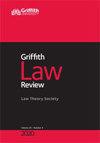Sources of Indigenous Fijian ‘law’: village mores versus town-based criminal laws
IF 0.9
Q1 LAW
引用次数: 1
Abstract
ABSTRACT The aim of this article is to reflect on oral history interview data provided by an ex-soccer star who played for Fiji and in what is now the Fiji Premier League, and reconcile his criminal past (according to town-based criminal laws) with his current village assistant headman status. The article compares and contrasts two sources of law – customary Indigenous traditions of rights and responsibilities and town-based criminal laws, which have their origins in British colonial-era laws and are now administered and enforced by the neoliberal Bainimarama government. Because the soccer star’s jewellery store robberies were of Fiji Indian-owned stores, it is difficult for them to penetrate into the world of ‘village-space’, other than as a repressed spectre, since non-Indigenous people cannot live in Indigenous villages. For the Indigenous Fijians, ‘town-space’ is a place for employment, education, venturing out and partying, beyond the gaze of village elders, whereas ‘village-space’ is the ordered space of home and community. ‘Quasi-space’ is here defined as space physically in the town, but when Indigenous people are the only ones present, or a clear majority, some aspects of village understandings can dominate in that space at least for certain time periods and with variable intensity.斐济土著“法律”的来源:乡村习俗与基于城镇的刑法
摘要本文的目的是反思一名前足球明星提供的口述历史采访数据,他曾为斐济效力,现在是斐济超级联赛,并将他的犯罪过去(根据城镇刑法)与他目前的村助理队长身份相协调。这篇文章比较和对比了两种法律来源:传统的土著权利和责任传统,以及基于城镇的刑法,它们起源于英国殖民时期的法律,现在由新自由主义的Bainimarama政府管理和执行。因为这位足球明星抢劫的珠宝店是斐济印度人拥有的商店,所以他们很难渗透到“村庄空间”的世界,除了作为一个被压抑的幽灵,因为非土著居民不能住在土著村庄。对于土著斐济人来说,“城镇空间”是就业、教育、冒险和聚会的地方,超越了村庄长老的视线,而“村庄空间”是家庭和社区的有序空间。“准空间”在这里被定义为城镇的物理空间,但当土著居民是唯一在场的人,或者是明显的多数人时,村庄的某些方面可以至少在特定时间段内以不同的强度在该空间中占主导地位。
本文章由计算机程序翻译,如有差异,请以英文原文为准。
求助全文
约1分钟内获得全文
求助全文

 求助内容:
求助内容: 应助结果提醒方式:
应助结果提醒方式:


